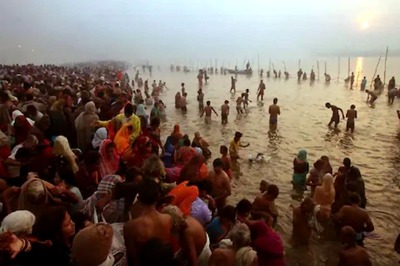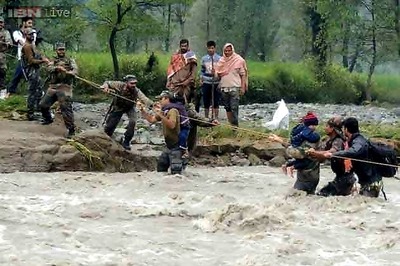
views
New Delhi: Prominent Muslim body Jamiat Ulama-i-Hind on Wednesday said the Supreme Court’s verdict in the Ram Janmabhoomi-Babri Masjid land dispute case will be acceptable to it and appealed to Muslims to respect the verdict.
Hours ahead of his meeting with Rashtriya Swayamsevak Sangh (RSS) chief Mohan Bhagwat, Jamiat president Maulana Arshad Madani addressed a press conference where he spoke on a wide range of issues, including NRC and lynching, besides the Ayodhya title suit.
He asserted that Muslims’ claim in the Ayodhya case is based on historical facts and evidence that the Babri Masjid was constructed without demolishing any temple or any other place of worship.
While stressing the Babri Masjid would always be a mosque, he said it would remain so under the Sharia law till the Judgement Day even if the government tried to change its status by using might.
Madani said, “The Supreme Court is not the place for ‘aastha’ (faith). It is the place of ‘kanoon’ (law). After the arguments made before the apex court, we have faith that it would pass a verdict keeping the law and Constitutional values in mind. It will be based on facts and not faith.”
"Every justice-loving person wants the case to be adjudicated on the basis of hard facts and evidence and not on the basis of faith and belief," he said, adding the Supreme Court has also stated that it is only a title suit case.
Urging all citizens to maintain peace irrespective of the nature of the verdict, he said, “We reiterate our old stand that whatever judgement the Supreme Court delivers on the basis of facts and evidence, we will accept it and we also appeal to Muslims and fellow citizens to respect it."
The Ayodhya case is not merely a case of land dispute, but a test case of the supremacy of the law, he was quoted as saying by a statement issued by Jamiat.
The apex court is expected to give its ruling in the emotive and politically sensitive Ram Janmabhoomi-Babri Masjid land dispute case before November 17 as Chief Justice Ranjan Gogoi, who is heading the Constitution bench in the matter, demits office that day.
Madani said, “The arguments over the Babri Masjid case are over in the Supreme Court. The verdict is a much-awaited one. After we gained Independence, the issue of Ram Lalla came up. The Jamiat did not take to the streets over the issue, but continued to repose faith in the law of the land. That fight has extended for too long and now 70 years have passed. The matter now is with the SC and we were the first ones to move the apex court. We had the mosque in Ayodhya since 400 years before it was demolished.”
A note from the Muslim body said, “No individual or organisation has any right to surrender the mosque in the hope of getting any alternative.”
He added that the demand for peace in the face of verdict is from the government and RSS. “Hindu-Muslim amity is very close to us. Our organisation is completing 100 years this month and continue to believe in the fact that this unity is the spine of the country.”
When asked about reconciliation, he said, “It can happen if both parties come down from their viewpoints, we agreed to concede ‘Ram Chabutra’, ‘Sita Rasoi’, but the Ram Lalla side was not ready to revise its demand.”
He also spoke about the issue of National Register of Citizens that has been implemented in Assam and the BJP leaders speak of executing across the country.
Madani slammed BJP national president and Home Minister Amit Shah for speaking about citizenship on the basis of religion, which he said was against the ethos and traditions of the country.
“As a member of Parliament, the speech he gave in West Bengal (over NRC) is against his position. What he said was also in contradiction to my interaction with the RSS sarsanghchalak,” he said.
Regarding abrogation of Article 370 of the Constitution that granted special status to Jammu and Kashmir, he said, “It is not right to ignore the sufferings of Kashmiris because they are Muslims and from Kashmir. There should be discussions between them and the government to resolve the issue.”
When asked about lynching, he said, only governments in BJP-ruled states were not doing enough on the issue.



















Comments
0 comment